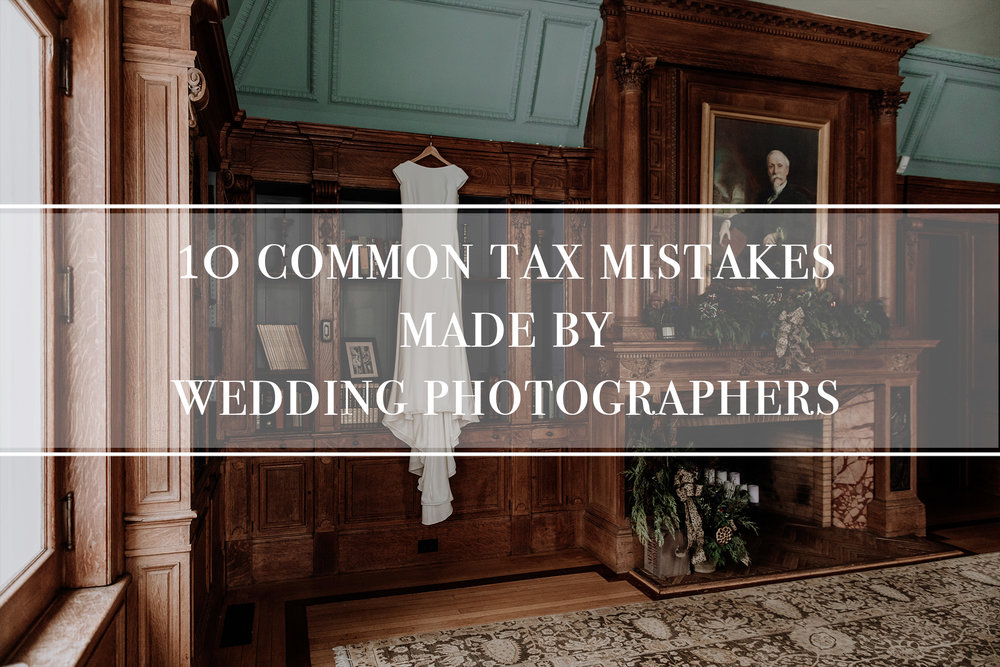
Probably the least interesting part of running a wedding photography business is trying to wrap our heads around all the tax stuff.
As a small business setup as a Limited Liability Company (LLC), there is a world of tax law and requirements that we were never used to in our normal life pre-business, because our “day job” employers would handle the vast majority of the details. We knew enough about collecting our W2’s and giving them over to our accountant, but that was about the extent of it. Now with a small business, we have learned first hand the challenges that come with handling taxes, accounting for all earnings & expenses, and the benefits of learning as much as possible about all of this.
Truly, in our first year of operating our business, we probably spent more time behind the scenes making sure we filed the right paperwork and were accounting for all the things we need to, to make sure we would not be in for some huge tax bill – than actually taking photographs. As people who love photography, it can feel like a difficult trade off at times to have to be responsible business owners and actually do all the things required to run a business, and put off the one thing we really like about our business at times.
At this point, though, we have it down (roughly) to a science. We have learned a lot in the past year, and were able to successfully set our expectations for how much we would owe the government before hand – and have it set aside in advance so we would not be crushed under the weight of some huge owed tax burden.
Before we begin, keep in mind that we are not trained tax professionals. You may find our thoughts useful as we see this whole world of business taxes from a similar perspective as you (as a small business owner). The nitty gritty questions you may have are better reserved for talking to an actual CPA in your area.
10 Tax Mistakes Made by Wedding Photographers Explained

1). Work with a Certified Public Accountant (CPA). We just want to get this one out of the way. When it comes time to file your taxes, have a professional accountant take care of the work. Yes, this is a paid service – but we believe it will spare you a lot of headache in the long run. You may be able to manage yourself with a product like TurboTax if you have a very small amount of business income & expenses, but if you made any significant earnings and are claiming a range of deductions, it’s for the best to have someone whose job it is to look over your business earnings & expenses and use their thorough knowledge of the law and best accounting practices to get your taxes into good shape.
If you are based in the Philadelphia and surrounding regions, we can recommend Engage CPAs as they has done our personal taxes for a long while now, and has been very helpful in getting our business situation under control.
2). Keep accurate records of your sales and purchases. One of the more difficult starting areas when it comes to starting a business is figuring out how to track all of the sales and expenses. While it is really not too difficult once you get going, learning where to start can be hard – especially if you are like us and never had an accounting course in school. In reality, there are some different methods for doing this – mostly depending on how much money you have to spend for convenience. Just search for “accounting software” and you are going to get many options – with the most popular being QuickBooks. While this is on our radar for the future, we currently are using a Microsoft Excel accounting template for tracking purposes, and it is working just fine for our needs. At about $75 dollars a year for Microsoft Office 365, Excel comes packaged with some other valuable software (particularly Word and Outlook) – and it just makes sense for our business needs right now.
Having the right accounting program for you is just the start. The next step is really fairly simple: keep logs of everything you sell or purchase. Include all necessary information such as product names, receipt/invoice numbers, purchase cost (or how much you earned off the sale), date, etc.
3). Keep all receipts – especially the big ticket items. As a part of keeping accurate records, you will want to keep track of all receipts you collect for purchases made throughout the year. We find the easiest way to do this is to keep most spending online. The majority of our big ticket purchases (so camera bodies, camera lenses, flash equipment, etc.) are made online through Amazon. This way we can quickly pull up the receipt online for the things we buy. Of course, not everything can be purchased like this. In our experience, it is especially true when meeting with clients over coffee, where we might buy the coffee on our business cards. These little receipts often have a tendency to get misplaced, so we make an effort to immediately file them once we get home. In the scheme of things, if you misplace a couple small receipts for a few dollars worth of coffee, the IRS is probably not going to come knocking on your door. The big ticket items – the ones that sell for hundreds or thousands of dollars – are the most important. If you don’t have receipt of these purchases, you may not even be able to write them off as expenses for the year, which will hurt big time.
4). Separate personal and business finances. If you are set up as an LLC or corporation, it is critically important to separate your personal finances from your business finances so as to maintain the protections over your personal assets that come with operating as a legitimate business. Basically, the starting point is to set up a business bank account and business credit card – so you can keep the things you purchase, and money you make as a business, separate from the things you buy day-to-day for yourself (like groceries) or other earnings you might make elsewhere (like working another job).
In our experience, this isn’t so much difficult as it is tedious. Initially, it took close to a month to get our business credit card in the mail so we could use it (same with our debit card after we set up our account). It’s a real pain, especially when you have a list of things you want to purchase, but want to hold off on until you can actually put it on a business account so it is separate from your personal finances. A challenge, but it’s smooth sailing once you get everything set up. We were, at least, smart to get this ball rolling in January when things are traditionally slow in the photography industry anyways.
5). Don’t forget to track mileage. Given that wedding photographers traditionally do a good deal of traveling, tracking mileage is even more important than some other small business industries because the savings can add up to be substantial. We initially tried doing this by hand, but it became a real pain quickly as the government requires you to track both personal and business mileage on your car. It turns out, the best solution to this is an inexpensive service called MileIQ. Using MileIQ, our drives are automatically logged thanks to the app which is able to track when we are driving (or not driving) automatically – and it actually works. In 2017, we logged over $2,000 in business driving expenses we could write off our taxes. It’s one of the few services that pays for itself. In 2018, do to a lot of driving we will be doing out of state or across the state, we are expecting to easily hit $3,000 in business driving write offs – a huge saving. If you use this link, you can get 20% off your first year!
If you’d like to learn more about MileIQ, check out our article The Perks of Using MileIQ for Your Photography Business

6). Pay estimated income taxes quarterly. This is one of the areas where we messed up in our first year of business. Fortunately it was not a huge issue, but we ended up owing more taxes at once when tax season came around. We were fortunately prepared for this, but apparently the IRS expects incremental payments as the year goes on. Determining how much estimated tax you might owe is sort of beyond us to say, so talk to your CPA for more suggestions.
7). Pay sales tax quarterly, too. All the taxes small business owners are no fun – we wish they could at least be rolled into one payment to make things easier. But, unfortunately, the tax system is designed to be complicated and time consuming until you figure it out. When it came to sales tax, we were on top of this and made our payments quarterly. In Pennsylvania, you will use the e-TIDES portal for making payments online. They also list the payment schedule dates clearly on the website, which helps with keeping track of when you need to file your taxes.
8). Choose the right legal entity for your business. We spoke earlier about how we set our business as an LLC. This is a common legal entity type for photography businesses, but not the only option available to you. Aside from operating as a Sole Proprietorship (the most basic type of business entity), an LLC is quite simple to understand – but depending on factors such as the amount of money you are making with your business, you may want to consider operating as a Corporation or S-Corp. This is yet another topic for someone more knowledgeable of business tax laws, and discussing with them the pros and cons of different legal entities could be useful for you.
9). File early or on time. Any tax filings should be filed promptly. In some instances, filing early will net you a discount as we have seen with filing of our sales tax statements. Of course, on the opposite end, filing late will no doubt lead to some troubles such as late fees. Not paying for an extended period of time leaves you open to a lot of other problems as it becomes more of a criminal action that will see you in a lot of trouble.
10). Missing out on valid deductions. While some people may claim things they shouldn’t be deducting, we imagine more people don’t take advantage of valid tax deductions. Again, you can get more clarity on this really detailed topic from a CPA – and even additional searching around the web for more accounting oriented websites – for more help. As our accountant told us, “if you are buying it for your business, you can probably right it off.” As a wedding photography business, some purchases are just so obvious as being for our business – like camera equipment. On other purchases, we sometimes question whether or not we should be billing it to our business, but in most cases (especially ones where we are dealing with a substantial amount of money, so think $100 or greater) we often charge it to our business account. Some examples of valid deductions some people miss out on are purchasing food while traveling for business (so for us…traveling to upstate NY for a wedding and staying the night…we right off the hotel stay + dinner) and education/continuing education courses.
These 10 common tax mistakes made by wedding photographers just begin to scratch the surface. It is important to educate yourself as much as possible about the tax code, and find ways to make it work in your favor. More importantly, it helps to know as the year goes on and you book more and more weddings how much money you will actually owe the IRS – so you aren’t met with a huge surprising tax liability come the start of the year.